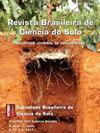Biochar decreases nutrient leaching in KCl-fertilized Podzols grown with black mucuna
IF 2
4区 农林科学
Q3 SOIL SCIENCE
引用次数: 0
Abstract
: Podzols are highly sandy soils, in which elements, such as potassium, needed by crops, are easily leached. Studies have indicated that biochar can contribute to increasing cation exchange capacity of the soil, which can improve the retention of bases. This study aimed to evaluate the effect of the poultry litter biochar combined or not with increasing doses of KCl, on leaching and soil base content, on the production of green manure biomass, and on the distribution of K in the soil-water-plant system. A 2 × 3 factorial experiment was conducted in randomized blocks with 6 repetitions: without and with biochar (1% v / v, produced from poultry litter) × without K, with 53.65 and 107.30 mg dm -3 of K (as KCl). The experiment was carried out in four steps: Step 1) Soil incubation with the treatments (for 20 days) followed by chemical analysis of the soil; Step 2) First leaching: the containers (made with PVC with 0.30 m high) received the newly incubated soil in the surface layer and soil without treatment in the subsurface layer. The containers received water until saturation plus 50 % of the total pore volume and the leached water was collected and analyzed; Step 3) Cultivation of green manure ( Mucuna aterrima) in the containers of Step 2 and harvest within 40 days (evaluation of biomass and K content); Step 4) after the mucuna harvest, the containers were subjected to second leaching. The leaching solution and the soil from the surface and subsurface layers were collected for chemical analysis. Biochar increased the pH, cationic exchange capacity, P, K, Ca, and Mg levels in the newly incubated soil, in the surface and subsurface layer. The increasing doses of KCl proportionally increased biomass production and K accumulation in green manure, and the biochar increased this response and reduces the need for potassium fertilization by 50 %. With biochar, the accumulation of total K in the soil-plant-water system increases by 125 % and, in the soil-plant system, by 145 %. Biochar changes the K ratio in the soil-plant-water system. With biochar, proportionally, the highest accumulated percentage of K occurred mainly in the soil surface and subsurface layer, and did not result in higher percentages of K in the leached water. Biochar produced from poultry litter can be used as a good alternative to improve the chemical properties of Podzols and reduce nutrient losses.生物炭减少了黑色黏液生长的钾肥肥壤的养分淋失
本文章由计算机程序翻译,如有差异,请以英文原文为准。
求助全文
约1分钟内获得全文
求助全文
来源期刊

Revista Brasileira De Ciencia Do Solo
农林科学-土壤科学
CiteScore
3.00
自引率
11.80%
发文量
32
审稿时长
9-24 weeks
期刊介绍:
The Revista Brasileira de Ciência do Solo is a scientific journal published by the Brazilian Society for Soil Science (SBCS), founded in 1947, and is responsible for the propagation of original and inedited technical-scientific work of interest for Soil Science.
Contributions must not have been previously published or submit to other periodicals, with the only exception of articles presented in summarized form at professional meetings. Literature reviews are accepted when solicited by the Editorial Board.
 求助内容:
求助内容: 应助结果提醒方式:
应助结果提醒方式:


